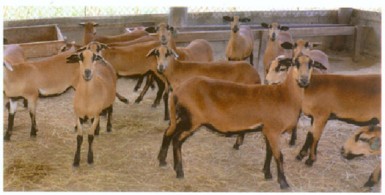Guyana is among a number of Caribbean Community (Caricom) countries benefiting from the support of the Food and Agriculture Organization (FAO) in the development of a viable small ruminant industry in the region.
The FAO is currently in the process of implementing a project designed “to promote the strengthening of the small ruminant sector.” The sum of US$498,000 will directly benefit Antigua and Barbuda, the Bahamas, Barbados, Belize, Dom-inica, Guyana, Grenada, Suriname, St Lucia, and St Kitts/Nevis.
Stabroek Business has learnt from the local office of the FAO that the overall objective of the project is “the modernization and strengthening of national and regional capacities to implement management practices of small ruminants to boost regional food production and address food and nutrition security and rising food prices.”

While the small ruminant industry—sheep and goats—in the region is a relatively modest one it is an important element of the livestock development programmes of the countries of the Caribbean. Sheep and goats have been effectively integrated into small farming systems and their high rate of multiplication, their utilization of farm waste and intensively grown fodder as well as their adaptability to scrub lands, enable them to make a significant contribution to farm income.
There are approximately 2,640,966 sheep and 3,516,607 goats in Caricom countries, the majority of which are found on small family farms where a mixed, integrated crop-livestock farming system is the norm.
The FAO says that the small ruminant industry in the Caribbean is well placed for development. It has been a traditional part of the regional agriculture landscape and contributes to poverty alleviation, rural livelihood, food security and income generation.
However, according to the UN organization, there are several “binding constraints to expansion and development of the industry.” including the difficulty in procuring appropriate breeding stock to upgrade and maintain flocks, difficulty in accessing adequate land for pasture and foraging, the high cost of supplement grain-based feeds, praedial larceny and dog predation.
The FAO says that the production of meat and milk from small ruminants has not kept pace with regional demand for these products.
Imports of small ruminant meats from extra-regional sources and products from Australia and New Zealand account for more than 75% of the supply. This is despite the fact that the preference in the region is for fresh, local meat, produced from the region’s indigenous hair sheep and adapted goats. Goat milk imported from outside the region can also be found on supermarket shelves in some countries in the region.
The project seeks to build farmers’ capacity in the nurturing and feeding of small ruminants, pasture and fodder bank development and management, reproduction and breeding, small ruminant housing, preventative veterinary medicine and health care, record keeping, market development and the development of the small ruminant value chain. It also seeks to “strengthen the small ruminant farmers’ association that currently exists across the region leading to sustainability for long-term development of the sector.”
The project is also expected to enhance the beneficiary countries’ capacity to address the constraints to small ruminant production and some of the root causes of low productivity of the sector.
Livestock extension officers, animal health assistants and veterinarians of the regional ministries of agriculture who offer extension service and technical advice to small ruminant farmers will be direct beneficiaries through capacity building and training and other activities organized by the project.
The project will directly target and seek to empower these categories of workers as well as those who manage the livestock stations of the ministries and leaders of small ruminant farmers’ organizations.
The FAO says that beneficiaries will include women and youths who rear their own sheep and goats and manage their own farms.
The project will also focus on creating “an environment conducive to the creation of a sustainable industry built on value chain development where a policy, marketing and production recommendations and guidelines necessary for building a strong small ruminant industry would be formulated.”









